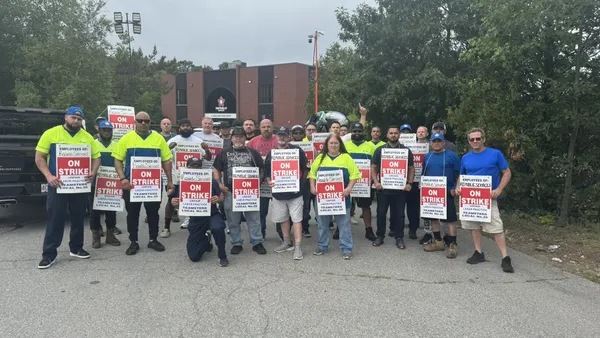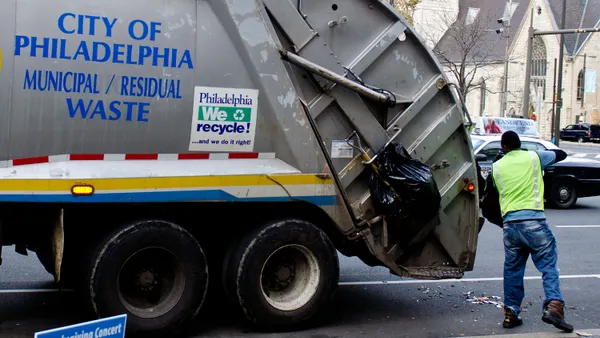The concept of creating an “Uber for trash” has gotten plenty of media buzz in recent years. Now, a new West Coast player called Trash Warrior is also citing Uber as inspiration and has backing from venture capital firms.
Fittingly, this tech startup is based in San Francisco, the birthplace and setting for the ride-sharing company’s rise. Founded in 2019, Trash Warrior’s service offers on-demand removal of junk, furniture and cardboard through a platform linking to a network of third-party haulers, allowing residential and commercial customers to schedule pick-ups and pay online.
In May, Trash Warrior announced it raised $1.2 million in pre-seed funding in a round led by AltaIR Capital along with Lightspeed Venture Partners, 500 Startups, Alumni Ventures Group and Lombardstreet Ventures. "Innovation has been painfully slow here,” said Clayton Bryan, a venture partner at 500 Startups, referring to the waste industry. “We formed a thesis and it aligned well with Trash Warrior's mission.”
Ultimately, Trash Warrior is the latest in a new breed of service providers rising in the waste management industry. It’s broadly similar to established companies such as Atlanta-based Rubicon, New York-based Recycle Track Systems (RTS) or Pittsburgh-based RoadRunner Recycling, which all focus on technology to connect customers with third-party, independent haulers.
Trash Warrior's platform is available in the San Francisco area, including Sacramento and San Jose, where it works with more than 100 service providers, according to founder and CEO Lily Shen. At the moment, the company is focused on building its presence in the Bay Area, where it must navigate franchise agreements between haulers and local municipalities as it looks to grow.
“We are only serving the needs of the clients that cannot be fulfilled by the current service offering of Recology and Waste Management,” said Shen. “Clients usually have nonstandard needs that need alternative solutions.”
It’s a balancing act, but she sees room for Trash Warrior to operate and provide a new service without violating franchise agreements, such as San Francisco’s contract with Recology.
“This exclusive permitted system does not provide legal opportunities for expanding services beyond Recology collectors as they are not permitted if they charge for their service,” said Joseph Sweiss, a spokesperson for the San Francisco Department of the Environment, in a statement. “With that said, the system is one that is currently helping maintain an open rate-setting process that serves our residents and enables us to push the envelope towards innovation and sustainability.”
But when it comes to the gap that a startup like Trash Warrior can fill in the market, software-focused companies can bring transparency to waste and recycling needs and service provision, said Donald Gambelin, head of business development and sales at the new recycling technology company EverestLabs.AI. Gambelin's perspective comes from being a veteran of companies such as Republic Services, Recology and Compology.
“Data-driven transparency can help increase diversion significantly and help to reduce climate-affecting emissions and traffic congestion,” said Gambelin, speaking about the overall market. “I foresee something similar to parcel service companies like a UPS or FedEx. They don't come to your door to ask if you have a package for them today. They use intelligent and simple technologies to provide service when needed.”
With venture capital backing, Trash Warrior sees an opportunity to establish a foothold in the sector. The new funding is devoted to quickly scaling up its product, expanding sales and marketing, and launching in new markets.
“We want to grow very fast,” said Shen. Currently, she reports Trash Warrior is growing revenues 30-40% month over month. In the process, Shen hopes to take on services such as 1-800-GOT-JUNK? and potentially Rubicon, which has an office in San Francisco.
In terms of expansion, Shen is focused on the West Coast, but declined to mention specific markets. She sees an opportunity to gain early advantage in this region as competitors are more established on the East Coast — although RTS recently expanded its presence in Western states, including California, through the acquisition of accounts from Enevo.
Here, Shen takes inspiration from Uber’s competitors, noting difficulties it faced expanding overseas into markets with copycat ride-hailing services. “It’s not that easy to launch in a new market,” she said.
When it comes to developing its platform and technology, Trash Warrior has a usable website that brings in customers, according to Shen, but there’s room to improve user experience. “There are many features we could develop on top of it that will make the market-matching process more efficient,” she said.
Entering the market
Trash Warrior’s origins trace to 2015, when Shen moved to San Francisco. With degrees from Princeton and Harvard, she was working there as a senior consultant with McKinsey, before joining software developer Niantic as a product manager, which included working on the viral game Pokémon Go.
Living in the Bay Area, she found the local streets very dirty, which stood in contrast to the area’s affluence. “On-demand street cleaning, that was the idea initially,” said Shen, who left Niantic in 2019. But that proved a difficult sell, as people weren’t willing to pay for it.
Shen then pivoted to waste removal, and found independent haulers were interested in a platform offering easier access to gigs. “They spend more time searching for a job instead of servicing the jobs,” she said.
Trash Warrior was formally launched as a waste removal service in September 2019, after beginning development earlier in the year. Shen has since assembled a team of 10 employees, and participated in a 500 Startups acceleration program in early 2020, while simultaneously raising funds as the COVID-19 pandemic unfolded.
“Founder and CEO, Lily Shen, is an exceptional problem solver and great data-driven product thinker,” said 500 Startups' Bryan. “Great purpose, strong leader, the time is right."
To attract service providers, Trash Warrior initially posted ads on Craigslist and Yelp. It also relied on referrals among haulers. Once recruited, providers go through a screening process, including a screening call, an insurance check and a background check.
So far, multiple customers are coming to Trash Warrior through online searches. One is Dennis Wong, the founder of San Francisco events space Colorbloq. His business has used Trash Warrior about 20 times since he came across it on Yelp. During cleanup after some events, Colorbloq found the shared container inside the building it occupies alongside other tenants was already full.
“We definitely needed an alternative solution, an ongoing alternative solution,” said Wong, who sees Trash Warrior’s scheduling features as its biggest advantage.
Trash Warrior also actively pursues clients seen as having specific waste management issues, including warehouses, restaurants and chains.
“You talk to them, almost for sure they have the same problems,” said Shen, adding she feels they just need to be persuaded Trash Warrior is a reliable provider that’s easy to use. “The money is ready, it’s there."
The startup also touts its affordability, including advertising prices 50% cheaper than competitors. Trash Warrior lists starting prices at $70 for junk removal and $60 for cardboard. Colorbloq’s Wong said the service cut costs by allowing them to reduce the share of collection they pay for through their landlord.
In general, the fee structure is similar to other on-demand services, according to Shen, with Trash Warrior taking a slice of payouts from each gig. But for some larger clients the arrangement is similar to a long-term software-as-a-service contract. The company is getting traction with bigger clients, said Shen, but larger customers have different needs, which the platform will incorporate through new features — another area the funding will help.
Looking ahead
The COVID-19 pandemic has affected Trash Warrior’s business alongside the wider waste and recycling industry. That includes other technology players, with RTS and Rubicon among the thousands of industry companies – including many in California – to receive loans through the Paycheck Protection Program.
Shen still sees demand for her business, pointing to growing reliance on e-commerce during the pandemic, with Trash Warrior getting more bookings from logistics companies and warehouses, as well as from busy grocery stores and markets. And she’s not worried about an economic downturn undermining her fledgling business because, “you can’t stop producing trash."
Shen is also experimenting with additional services, with Colorbloq's Wong noting he used Trash Warrior for graffiti cleaning. Another move customers have requested is container rentals. Areas such as organics collection are not on Trash Warrior’s radar for now.
The company could also look to sell data, as technology is its primary asset, but after starting with waste collection Shen wants to explore integrating recycling and transfer facilities onto Trash Warrior’s platform as partners and providers.
“If we want to scale up, eventually I want to get into the later stage of this logistics chain,” she said.










